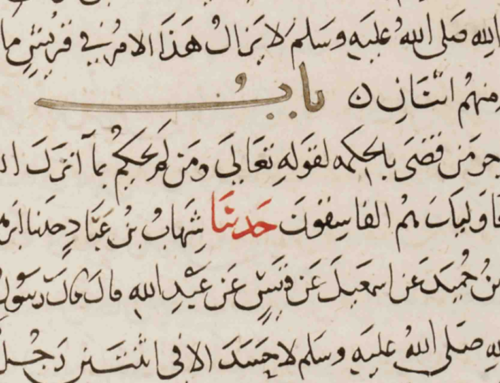Translated by Muhammad Hamood
Translator’s note: Following is an article on the issue of “assisting in sin” by the late Grand Mufti of Pakistan, Mufti Muhammad Shafi’, may Allah have mercy on him. Over the years, I have often found myself referring to this concise article to understand the parameters and scope of what is classified as assisting in sin in the Shari’ah. In order to advise anyone whether the action they are inquiring about really falls under this prohibition of assisting in sin or not, one needs to have an understanding of fiqh and its principles which are laid out so brilliantly in this piece by the author. It is hoped that this translation from the original Urdu will be of value to scholars and non-scholars alike and will provide guidance to those navigating this important issue.
Question
What do the eminent muftis say about the following matter? Zayd intended to build a property with the intention of leasing it and an owner of a bank agreed to lease this property [for the use of the bank]. After some discussion, Zayd fixed a rent for the bank’s owner, and based on the [prospective tenant’s] needs, he built the property so that it would have a large room for an office, a strongly built and well protected vault for storing valuables, homes for the security staff, etc. Everything was kept as it should be [for a bank]. In short, the appearance that is necessary for a bank was taken fully into consideration in the [construction of this] property.
A few days after doing this, Zayd, who had fallen ill, wondered whether leasing his property to a bank and earning income from it is permissible. He consulted a scholar on whether leasing his property to a bank is permissible. He was doubtful and requested the scholar to research [the issue]. After researching the matter, the scholar said that Imam Abu Hanifah stated it is permissible to lease a property for a haram (unlawful) activity or business. The evidence of the imam is that the landlord is a causer of sinful activity but the tenant commits the sinful activity out of choice. His principle is that when there exists a person who acts out of choice (fa’il mukhtar) in between the causer and the sin then the attribution of the sin is towards this person [and not the causer]. The Sahibayn (i.e., Imam Abu Yusuf and Imam Muhammad) state that this lease is impermissible due to it assisting in sin as Allah Most High says [in the Qur’an], “And cooperate in righteousness and piety, but do not cooperate in sin and aggression.” (5:2)
Now, most books [of fatwa] do not mention which one of these statements is relied upon (mufta bihi) although Hashiyah Zayla’i Chilpi [1]Referring to Shihāb al-Dīn al-Shilbī’s marginalia on Tabyīn al-Haqāiq Sharh Kanz al-Daqā’iq. states, “The statement of the Imam is qiyas (inference by analogy) and the statement of his two companions is istihsan (juristic preference).” According to the principles [of the Hanafi school] when there is a conflict between qiyas and istihsan, the fatwa should be [given] on istihsan. In Khulasat al-Fatawa, the statement of the Imam has been related as follows, “The lease is valid but he will be sinful.” From this it can be understood that even though the lease is valid according to the Imam due to qiyas but due to it assisting in sin, it incurs sin. Hence, the source of the statement of the Imam and the statement of the Sahibayn is the same.
The ruling of leasing this property for an interest-based business (i.e., bank) in light of the statements of the Imam and the Sahibayn is sought. Is it permissible or not? Please provide a clear response with evidences.
Al-Mustafti [2]One who seeks a fatwa (legal ruling).
Shah Nur Khan, Kishoreganj, Mymensingh District, East Pakistan [3]Modern day Bangladesh.
Answer
There are different levels of assisting in sin (i’anah ‘ala ‘l-ma’siyyah) and being the cause for sin (tasabbub li ‘l-ma’siyyah), and for this reason there are different rulings [for each]. Upon the instruction of my master, Hadrat Hakim al-Ummah [Mawlana Ashraf ‘Ali Thanawi] (d.1942), this lowly one began writing a detailed treatise on this topic as the explanations of the Hanafi jurists on this issue come across as seemingly contradictory. During the writing of this treatise, Hadrat (may Allah have mercy on him) passed away. Once I started recovering from this grievous blow, I made the intention of carrying out this command.
The issue [mentioned in the question] had become very complicated and the shade of a perfect spiritual guide over my head had been lifted. I remained engrossed in studying books [on this topic] for several weeks, and praying, until at last Allah Most High placed the answer to this difficult issue in my heart. I wrote the answer and showed it to my respected teacher, Mawlana Shabbir Ahmad ‘Uthmani (may Allah have mercy on him), and he liked the answer. This treatise is about eight to ten pages long and is in the Arabic language. I am unable to relate it [in its entirety [4]See Jawahir al-Fiqh, p.439, vol. 2. but] whatever this lowly one has written, a very concise summary of it is [as follows].
The [type of] assistance for sin which is haram according to the Qur’an is that which includes an intention to commit sin in the real sense (haqiqatan) or in the effective sense (hukman). [Having an intention to commit sin in] the real sense is when it is in one’s heart to commit a sinful action through something or when [an intention to commit] sin is made apparent in the main body of a contract from [at least] one of the contracting parties. [Having an intention to commit sin in] the effective sense is when [one intends to make or sell] a thing [that] is not used for any purpose besides sin. For example, one may not have the intention of sinning while making or selling musical instruments such as tambourine, violin, etc. but they are [still] considered as intentionally assisting in sin in the effective sense. Wherever the intention of committing sin is not present in the real or effective sense, it will not be considered assisting in sin.
On the other hand, there is another thing which is similar to assisting in sin known as “being the cause of sin” (tasabbub li ‘l-ma’siyyah) and it too is haram according to the Qur’an. This is regardless if it has a sinful appearance or not. For example, the prohibition of insulting the gods of idol-worshippers has been mentioned in the Qur’an [5]“And do not insult those they invoke other than Allah, lest they insult Allah in enmity without knowledge.” (Qur’an, 6:108) because it becomes the cause for insulting the True God. Similarly, the hadith [6]Sayyiduna ‘Abdullah bin ‘Amr narrated: Allah’s Messenger (ﷺ) said: “It is one of the greatest sins that a man should curse his parents.” It was asked (by the people), “O … Continue reading has declared insulting someone else’s parents as the same as insulting one’s own parents on the basis of it becoming the cause [of sin]. In [the ayah], “And let them not stomp their feet to make known what they conceal of their adornment (Qur’an, 24:31)”, the prohibition of stomping of feet for women is based on it becoming the cause [of sin]. [In the ayah], “Do not be soft in speech [to men] … (Qur’an, 33:32)”, the prohibition is also based on this [rule]. And this is even though there is not even a slight possibility of [one having] a sinful intention in all of these matters.
However, one important aspect that is worthy of attention in this discussion is that tasabbub (being the cause) is such a vast word [i.e., concept] that it encompasses all permissible matters. If the meaning of tasabbub is applied in the general sense for all causes then perhaps no matter in this world will remain permissible. [For example,] the one who grows produce and fruit from the earth also becomes the cause for the enemies of Allah to benefit from these produce and fruits. In the making of clothing, homes, utensils and other things which are used, it is apparent in all of these that they are bought and used by the pious and the impious [alike]. And the impious also use these things in their sins and transgressions. The cause for all these [sins] is the one who made these things. If prohibition was generally applied like this then perhaps nothing will remain permissible.
Therefore, it is necessary to differentiate between the immediate cause (sabab qarib) and the remote cause (sabab ba’id) [in these matters]. The immediate cause would be prohibited and the remote cause would be permitted. The above-mentioned examples are all examples of the remote cause therefore they will remain permissible.
Furthermore, the immediate cause is also of two types:
(1) The first [type] is the cause that induces the sin [i.e., directly causes the sin]. If this cause is not present then there is no apparent reason for the sin to occur. The occurrence of such a cause is the same as committing the sin. Referring to this type of cause, ‘Allamah Shatibi (d.790AH) writes in the introduction of al-Muwafaqat: “The occurrence of the cause is equivalent to the occurrence of the effects”.
In the Qur’an where “being the cause of sin” has been declared haram such as insulting the gods of the idol-worshippers, women’s stomping of their feet, their speaking softly [to men] or tabarruj al-jahiliyyah (“display of the former times of ignorance” [7]Qur’an, 33:33. ), all of these are the types of causes which induce the sin and cause it to occur. The undertaking of such causes is understood to be the same as committing the sin [which is caused by it] therefore it is haram by consensus.
For this reason, the sin will be attributed towards the person who undertook the cause. And the attribution of this sin will not be removed from this person if another person who acts out of choice came in between [the cause and the sin] such as the hadith stating that the person who insults another person’s parents insults his own parents [8]For example, let’s say a person named Adam insulted his friend Khalid’s parents. Khalid, in this case, is the fa’il mukhtar, i.e., the free-willing person who has the choice to either insult … Continue reading. This is because being a cause of sin is in itself a sin according to the Qur’an and hadith.
(2) The second type of immediate cause does not induce the sin [i.e., does not directly cause the sin]—even though it is an immediate cause. Rather, the [actual] occurrence of sin happens due to an action of someone else who acts out of [their own] choice. For example, the selling of grape juice to someone who will make wine out of it or the leasing of a home to someone who will worship idols in it. Even though such selling and leasing is an immediate cause for a sin from one perspective, it does not induce or [directly] cause the sin. Buying grape juice does not necessarily entail making wine nor does leasing a home to an idol-worshipper mean he will also worship idols in it rather these people become involved in these sins due to their [own] corruption and ignorance. The one who sells grape juice or leases a home does not induce or cause the sin [in these cases rather the buyer or tenant act out of their own choice in committing sinful acts using these things].
The ruling for such immediate causes is that if the intent of the seller or landlord was to commit these sins then this is unquestionably haram due to it being entered into the definition of committing sin and assisting in sin. And if this intention [to commit sin] was not included [in the sale or lease] then there are two scenarios of this.
Permissible scenario
The seller has no knowledge whether the buyer will make grape vinegar or [whether he will make] wine after purchasing the grape juice and the landlord has no knowledge whether the tenant will simply live [in his home] or [whether he will] engage in impermissible actions, sins and transgressions after leasing the home. In this scenario, the [aforementioned] sale and lease is permissible without any karahah (dislike).
Makruh scenario
If he has knowledge that the buyer is going to make wine from the grape juice he purchases or [the tenant will] engage in sin and transgression in the rented home … then in this scenario, the sale and lease is makruh (disliked). It is with regards to this scenario the difference of opinion of Imam Abu Hanifah and Sahibayn has been related although the [opinion of] permissibility that has been ascribed to Imam Abu Hanifah in this case is in the same meaning as has been related with reference to Khulasat al-Fatawa in the question [i.e., the lease is valid but the landlord is still sinful].
Now, if the Sahibayn do not consider the contract [between the seller and buyer or between the landlord and tenant] to be permissible [i.e., valid] then this difference would be haqiqi (real) as the buying and selling of goods between the two parties is not halal [according to them]. According to Imam Abu Hanifah, the contract is valid but it is sinful [to engage in it].
If the outcome of Sahibayn’s opinion of impermissibility is also only sin, and not the fasad (invalidity) of the contract, then this difference [between the imams] is just lafzi (lexical). [According to this understanding] the Sahibyan have declared it impermissible in the meaning of [it incurring] sin and the Imam declared it permissible in the meaning of the contract being permissible, not in the meaning of [it incurring] no sin.
Furthermore, the aforementioned makruh is also of two types: (1) Sin is associated with an object without it undergoing any change or (2) sin is associated with an object after it undergoes some change. The first type is makruh tahrimi (prohibitively disliked) and the second type is makruh tanzihi (slightly disliked). The difference of makruh tahrimi and makruh tanzihi that is seen in the texts of Fatawa Qadi Khan and other books of jurisprudence can be reconciled with the details [mentioned above]. And all praise is for Allah.
Conclusion
After this, the issue under discussion can be assessed. Since it does not have the meaning of assisting [in sin] in it—neither the intention to assist in sin exists in the real sense nor does it exist in the effective sense—and [the meaning of] being the cause of sin does not exist with a cause that induces sin [i.e., directly cause sin] therefore it is not from the clearly haram matters. On the other hand, it does pertain to the second type of immediate cause that does not induce sin [i.e., does not directly cause sin] therefore if someone does not know whether the tenant will build a bank inside [of this property] then it is permissible without any karahah, and if he knows then it is makruh.
The ruling of makruh tahrimi v.s. makruh tanzihi in regards to this issue should be looked into [further]. If it is known that the builder has constructed the rooms inside the property that are appropriate for a bank then it is evident that it is makruh tahrimi [with regards to leasing this property in this manner]. And if it is understood that such rooms are not exclusively constructed for banks rather similar rooms are constructed for other [types of] offices as well then it can be said to be makruh tanzihi. Until now I am not certain whether this should be considered makruh tahrimi or makruh tanzihi. You should consult other scholars [on this issue] as well. And this is only when this person keeps insisting [on continuing the lease to the bank] after being warned. If after being warned he repents but is unable to break the lease then he will be considered excused after making every effort to break it.
And Allah knows best.
Muhammad Shafi’ — may Allah pardon him
Safar 3, 1383AH
Jawahir al-Fiqh, p.457, vol. 2.
| ↑1 | Referring to Shihāb al-Dīn al-Shilbī’s marginalia on Tabyīn al-Haqāiq Sharh Kanz al-Daqā’iq. |
|---|---|
| ↑2 | One who seeks a fatwa (legal ruling). |
| ↑3 | Modern day Bangladesh. |
| ↑4 | See Jawahir al-Fiqh, p.439, vol. 2. |
| ↑5 | “And do not insult those they invoke other than Allah, lest they insult Allah in enmity without knowledge.” (Qur’an, 6:108) |
| ↑6 | Sayyiduna ‘Abdullah bin ‘Amr narrated: Allah’s Messenger (ﷺ) said: “It is one of the greatest sins that a man should curse his parents.” It was asked (by the people), “O Allah’s Messenger (ﷺ)! How does a man curse his parents?” The Prophet (ﷺ) said, “The man abuses the father of another man and the latter abuses the father of the former and abuses his mother.” (Sahih al-Bukhari) |
| ↑7 | Qur’an, 33:33. |
| ↑8 | For example, let’s say a person named Adam insulted his friend Khalid’s parents. Khalid, in this case, is the fa’il mukhtar, i.e., the free-willing person who has the choice to either insult Adam’s parents back just like Adam did or not respond in this way at all. The fact that Khalid has a choice to do or not do something has no bearing in this type of immediate cause which Adam undertook. Adam is considered sinful simply for uttering words which become a cause for a sin to occur. |






